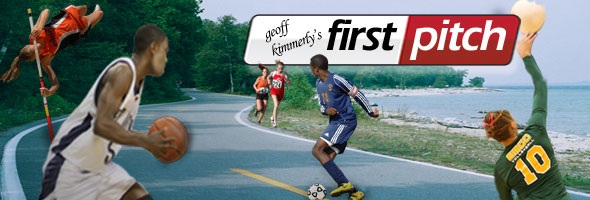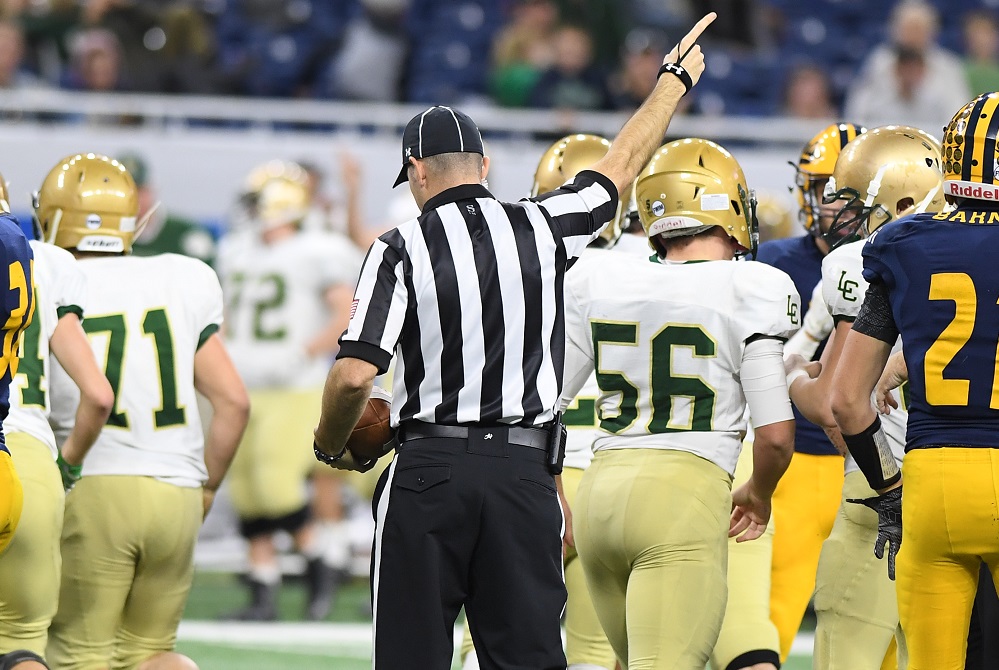
Good News in Officials Recruitment, Hockey
May 22, 2018
By Geoff Kimmerly
Second Half editor
The MHSAA continues to explore ways to interest and invite potential officials to join the ranks of those who play massive roles in administrating our games all over the state.
A few recent efforts have produced excellent results and ideas for the future.
On Saturday, longtime officials Brian Morley and Bruce Moore, along with the Bay Metro Officials Association, hosted at Grand Blanc High School a free clinic for those interested in becoming basketball referees.
 The MHSAA also set up a table at the event and provided free registration for attendees – and 31 signed up with the MHSAA on the spot. The Association’s in-person presence at the clinic also gave attendees an opportunity to ask questions and learn more about the next steps after taking part in the training.
The MHSAA also set up a table at the event and provided free registration for attendees – and 31 signed up with the MHSAA on the spot. The Association’s in-person presence at the clinic also gave attendees an opportunity to ask questions and learn more about the next steps after taking part in the training.
All 31 will be first-time basketball officials, and most registered to officiate for the first time in any sport.
More great steps came April 29 as the Jackson Area Officials Association introduced the avocation to more than 30 aspiring officials at a meeting that also was designed for anyone interested in becoming an MHSAA basketball official.
Bill Walker, an organizer of the event and official for more than a decade in his area, said eligible Legacy Officials at the meeting were assigned mentors, and all attendees committed to attend a June clinic at Jackson College. Those leaving the area for college this fall were provided with officiating contacts in the communities where they will be attending school.
The upcoming clinic, free of charge and organized by Walker and Jackson College women’s basketball coach Heather Brown, will provide “real game” work for attendees as they receive training and mentoring.
Michigan Center coach and teacher Lisa Haynes and officials Jason Smith and Chuck Sprang also play instrumental roles in the JAOA recruiting effort.
O-K honors with new hockey divisions
This is older news in the Grand Rapids area, but definitely worth a statewide mention. The Ottawa-Kent Conference traditionally has named its hockey divisions Tier 1, Tier 2 and Tier 3, but has selected names to honor past contributors beginning with the 2018-19 season.
One division will be named after Ron Baum, a longtime coach at East Kentwood and the second winningest in MHSAA history. Another division will be named in honor of late Grandville standout Ryan Fischer, also a member of the MHSAA Student Advisory Council, who died in his sleep the night before his team’s Division 1 Semifinal in 2014. The third will be named for late official Dave Rue, who died in 2017 after a fight with cancer and was beloved in the hockey community.
Retiring official recognized
Also in hockey, Jenison took a few minutes to pay a touching tribute to official Ray Sheahan on the ice before his final MHSAA game – he retired at the end of this winter from high school hockey after 22 years as an MHSAA registered official.
Sheehan also has been involved in mentoring officials at various youth levels in the Grand Rapids area with an impact reaching far past high school rinks. Check out the tribute below:
PHOTO: Aspiring basketball officials listen in during a meeting with the Jackson Area Officials Association on April 29. (Photo courtesy of the JAOA.)

Be the Referee: Pass Interference
By
Geoff Kimmerly
MHSAA.com senior editor
September 2, 2021
This week, MHSAA officials coordinator Sam Davis explains the differences in high school pass interference rules from those at the college and pro levels.
Be The Referee is a series of short messages designed to help educate people on the rules of different sports, to help them better understand the art of officiating, and to recruit officials.
Below is this week's segment – Pass Interference – Listen
One of the big differences between high school football and the college or pro game is how pass interference is called.
In high school, there is no such thing as an “uncatchable” pass. If there is illegal contact by the defender while the ball is in the air, that’s pass interference, no matter where the pass ultimately ends up.
Also – in high school – a defender can “face guard” as long as no contact is made with the receiver. That is not pass interference, even if the defender does not look back for the ball.
Both of those interpretations differ from the college and pro game. Both (of those) levels have an uncatchable exception, and neither allows for face guarding.
Keep that in mind the next time you think you’ve spotted pass interference at the high school level.
Previous editions
Aug. 26: Protocols and Mechanics – Listen

